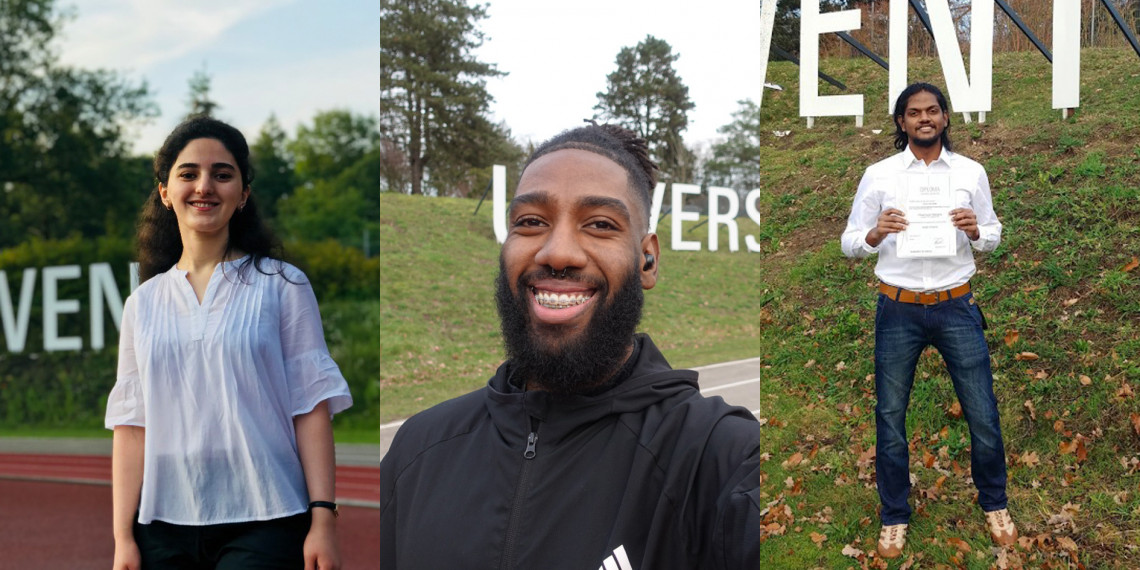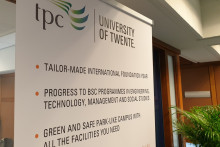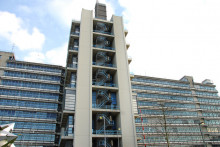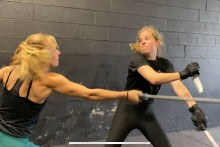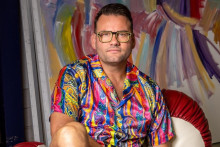Praveen Kumar from India, Charlie Chrie from Denmark and Dilafruz Yusifzada from Azerbaijan recall their first introduction to the UT as if it happened yesterday.
Who: Praveen Kumar (25)
- Obtained his master’s degree in System & Control (EEMCS) at the end of 2020.
- Place of residence: The Netherlands for the last three and a half years
- Comes from: Chennai (British name Madras), the fourth largest city in India with over 4 million residents
How are you enjoying your time in the Netherlands?
‘I feel as though I have changed from a boy into a man. It was difficult to adjust in the beginning, but that didn’t last long. The professors are friendly here. I like the fact there is no hierarchy. You can walk into a professor’s office here without an appointment. That is not an option in India. And having lunch with a professor is entirely out of the question.’
What was it like adjusting to campus?
‘The Kick-In helped me enormously. It was really fun and I soon made international friends. I found it tricky to strike a balance between my studies and the social aspect. I lived on campus for a year and a half and have now been living in Enschede-Noord for a year. I like the peaceful streets. I can walk or cycle around farms and meadows within a few minutes.’
What are the main differences between life here and life in Chennai?
‘Everyone greets one another on the street. Very unusual in the beginning, but I appreciate it. I also know who my neighbours are here and I know how they are doing. The food situation is difficult. There are no spices in the food and I still cannot get used to the Dutch lunch. I manage to eat a Dutch lunch once or twice a week. In India, lunch is a hot and luxurious meal with soup, rice and masala. Here it is cold and rushed.’
Can Indian culture learn anything from Dutch culture? And vice a versa?
‘People are reserved in India. The Dutch are honest in a direct - sometimes even impolite - way. I think you avoid misunderstandings and interpreting things incorrectly with the direct manner of communicating. On the other hand, India is known for traditional medical techniques and philosophies. Those are still relevant in the modern era. Not all those techniques have been scientifically proven, but it is a fact that yoga and meditation help people with anxiety, stress and chronic diseases. There are more and more yoga centres in the Netherlands, but it is good for children too. No attention is devoted to this in education.’
Are you struggling with the corona crisis?
‘It was a challenge, primarily because I was in the process of moving during the first lockdown. I struggled to find help with moving. In addition, my thesis and courses simply continued. Fortunately, I had a great landlord and a wonderful supervisor who gave me extra time. Other than that, it was fine. My friends and family in India are in a hard lockdown, but that’s fine so long as I know they are healthy.’
How did you enjoy your studies?
‘Excellent. I have the self-confidence of knowing how I can implement my knowledge. I am looking for a PhD in Europe, preferably in the Netherlands. My ambition is to return to Tamil Nadu (a federal state in the south of India) with my knowledge afterwards to make medical care more affordable. At the moment, only people with money can access care. I think I can make a difference.’
Has the UT played a big role in your development?
‘I am happy with what the UT has given me. The only downside is that I had to complete my thesis on campus. You are given more freedom to shape your thesis yourself in Delft or Eindhoven.’
Who: Charlie Chrie (24)
- Is finishing his Psychology studies (BMS) within a few months.
- Place of residence: The Netherlands for the last three and a half years (Hengelo and Enschede)
- Comes from: the Danish capital of Copenhagen (630,000 residents)
How are you enjoying your studies?
‘I am focusing on positive therapeutic psychology at the moment. To explain it briefly: if someone is depressed, you try to improve that by means of positive instruments. So you don’t tackle the depression, but you ensure positivity overwhelms the depression. Extremely interesting.’
What was it like having to adjust when you came to the Netherlands three and a half years ago?
‘Adjusting to the Netherlands went smoothly. At no time was I concerned about my new situation, because Danish culture is similar to Dutch culture. It was the first time I had lived on my own. So it will be strange when I return to Denmark soon, because I have never lived on my own there.’
In what way are the cultures similar?
‘The infrastructure, as well as the way in which society is organised. People feel free and democracy reigns. You notice that everywhere, both in Denmark and in the Netherlands.’
Are there any differences?
‘People are more open in Denmark. People here are more introverted. Many Dutch are only open when there is a need to make contact with someone, but not otherwise.’
Can Danish culture learn anything from Dutch culture? And vice a versa?
‘There are more unwritten rules to which people adhere in Denmark. You could call them moral codes. Recently, I was queuing at the check-out in the Netherlands and someone pushed in at the front of the queue. Incredibly rude. I said something, but no one else did. Even the woman at the front of the queue remained silent. Incredible. In Denmark, everyone would have come forward and informed the queue jumper of the rules.
Funnily enough, I think the principle works exactly the same in reverse. In Denmark, people are sometimes too involved in the affairs of others. Here in the Netherlands, if you say you are having a bad day, people understand and do not ask too many questions. Under the motto ‘Tomorrow is another day’. In Denmark, people keep asking questions. Sometimes it is better to leave someone in peace.’
Are you struggling with the corona crisis?
‘Let’s say it doesn’t help. I say that because I don’t want to exaggerate. It’s bizarre that a crisis such as this is necessary to show how extremely important social contact is. The effect a brief chat with someone else can have on you. In addition, sport is like therapy for me. I can clear my head during kickboxing training. That is not an option now and makes things difficult.
You are returning to Denmark soon. What are you going to do with the knowledge and experience you have acquired?
‘I don’t know what the future holds for me yet. Psychology is a very interesting field in which I undoubtedly see a future for myself. But I don’t yet know in what form. I am afraid that in time, I may sacrifice too much for the problems of others. I find the one-to-one conversations the most compelling, but it is always a one-way street. That is a focus point for me.’
Psychology is a subject that is sometimes shrouded in taboo in the Netherlands. Is it like that in Denmark too?
‘The Danish government does very well in that respect. There is a strong social safety net. People speak about their problems openly and it is absolutely not taboo. The situation in the Netherlands is a little trickier. An interesting difference, particularly because the countries are similar on so many levels.’
What role has the UT played in your development?
‘The UT generally does a good job. Many things are organised perfectly. There is help available for everything. You can stumble three times and the UT will help you up three times. I am impressed with that. The help I received often felt like the support of a parent. The only downside I can think of is that I missed activities. The Kick-In was terrifically well organised, but that was only in the beginning. I would have liked something like that more often.’
Who: Dilafruz Yusifzada (23)
- Obtained her master’s degree in Educational Science and Technology (BMS) in January 2021
- Place of residence: The Netherlands for the last two and a half years
- Comes from: Baku, the capital of Azerbaijan (2,375,000 residents)
How did you enjoy your studies?
‘It was wonderful in Enschede. I studied with over fifteen different nationalities around me. That will always stay with me. The study itself was good, but not perfect. I expected many practical programmes, but it was mainly theory. I got along with the professors very well.’
Did you struggle to adjust to the Netherlands?
‘It took some getting used to, but it didn’t feel like a culture shock. That was because I had already experienced a summer school in Germany. I made a conscious choice to come to the Netherlands alone. I wanted to see how I would adapt to the situation in another country. Azerbaijan and the capital of Baku is partly European and partly Asiatic. The Western perspective I encounter here is not unfamiliar to me.’
Are there big culture differences between Azerbaijan and the Netherlands?
‘I had to get used to the cuisine here. I was accustomed to a great deal of attention being devoted to preparation. To the use of herbs, for example. Here, people eat a lot of bread as the primary ingredient of a meal. In my culture, bread is often a side dish. The helpfulness of people in the Netherlands is incredible. I still remember seeing the conductor on my first train ride from Schiphol to Enschede and hurriedly grabbing my train ticket, visa and passport. He calmed me down straight away and bid me welcome to the Netherlands. I did not have internet on campus yet, but people walked with me to my apartment. Neighbours helped with my luggage. Really wonderful.’
Can the cultures learn something from one another?
‘If you ask for help in the Netherlands, then people help you. But it is always up to the person who needs help to take the initiative. People never do it of their own accord. In Azerbaijan, people help you if they see you need help. Conversely, people in Azerbaijan are envious of the punctuality of public transport here. If a train is due to depart at 13.09 hours, then the train departs at 13.09. They even tell you if there is a delay.’
How are you coping with the corona crisis?
‘I am grateful, because in retrospect, I timed it perfectly. I had all the data I needed in February. The lockdown came in March and then I was mainly busy writing. I sometimes felt alone, because my friends live in other parts of the Netherlands. Fortunately, I was able to maintain close contact with my family. The situation in Azerbaijan has always been similar to the situation here.’
Can you make a difference in Azerbaijan with the knowledge and experience you have acquired here?
‘I think so yes. I hope I can teach teachers, but I still have no idea what the future holds for me. I first want to gain more European experience so I can frame the past few years in the right perspective. Eventually I would like to return to Baku.’


